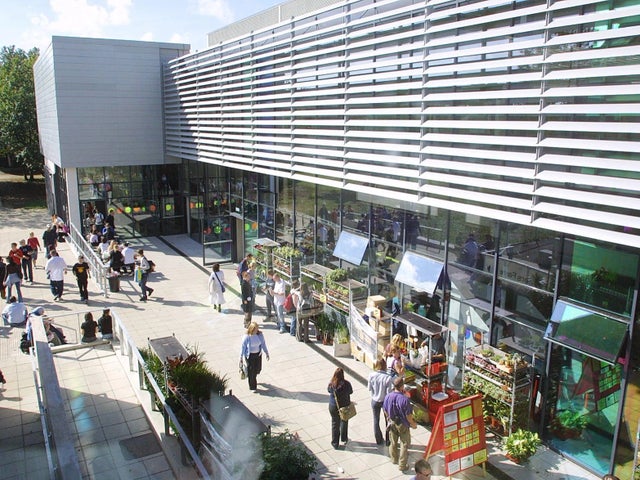Your Union menu
Build Confidence
The Students’ Union is an independent charity that exists to advance your education at the University of Portsmouth through a range of exciting services and activities. Our mission is to have a positive impact with every Portsmouth student: Students are heard, students are empowered, students thrive.
Elections menu
information
The Students’ Union Elections.
Get Advice menu
Get Advice
Campaigns and Info
At UPSU's Advice Service, we offer confidential, impartial and non-judgemental support on a range of academic and university issues that may affect your experience. Our team of trained advisers are on hand all year round to offer help where it's needed. The independent service works closely with the University of Portsmouth to resolve issues and ensure students are treated fairly.
Representation menu
UPSU are here to represent every student at the University of Portsmouth. We have many ways you can express your student voice, including: our Course Rep system, Have Your Say, Student Council, StART, Hot Topic, Annual Survey, Focus Groups, and more! Click on the tabs to learn more about each platform regarding Representation! You can also see a summary of our research by clicking on the UPSU Research & Data page.
Student Groups menu
Contact Us
Student Groups are a great development opportunity and a great place to find new friends, build a community and have a sense of belonging whilst at University!

Easter 2025
From ancient origins to modern-day celebrations, we explore how Easter has evolved over time
- Posted Thu, Apr 10, 2025 12:00 PM

Easter is one of the most important holidays in the Christian calendar, celebrating the resurrection of Jesus Christ on the third day after his crucifixion. While the first recorded Easter celebration dates back to the 2nd century, it’s widely believed that Christians began commemorating the event even earlier. Over time, Easter has evolved into a meaningful season filled with spiritual reflection, cherished traditions and celebrations enjoyed by people of all walks of life.
Interestingly, the date for Easter changes each year. This is because Easter is based on the lunar calendar rather than a fixed date. It is celebrated on the first Sunday after the first full moon following the spring equinox. Western Christian churches (Protestants and Roman Catholics) follow the Gregorian Calendar while Eastern Orthodox churches use the Julian calendar. Typically, Orthodox Easter falls later but in some years, like this one, both calendars align and so Easter will be celebrated on Sunday 20 April.
Easter is preceded by a 40 day period called Lent, a season of fasting and reflection that begins on Ash Wednesday and ends on Holy Saturday. Sundays aren’t counted in these 40 days as there are other celebrations taking place on those days.
The final week of Lent is known as Holy week, a deeply symbolic time marking the final days of Jesus’ life on Earth. It begins with Palm Sunday (Sunday 13 April this year), which celebrates Jesus’ entry into Jerusalem. Holy Monday and Holy Tuesday reflect on his cleansing of the temple and his teachings through parables. Holy Wednesday marks Judas’s betrayal, while holy Thursday commemorates the Last Supper, where Jesus washed his disciples’ feet in a powerful act of kindness and love.
In many Christian traditions, eggs are dyed red on Holy Thursday to symbolise both the blood of Christ and the promise of resurrection.
Good Friday remembers Jesus’ crucifixion and suffering, followed by Holy Saturday when his body lay in the tomb. On Saturday night, many churches hold an Easter Vigil, where the first candle (representing the light of Christ) is lit and passed through the congregation to show light overcoming darkness. Afterwards, some communities also visit graveyards, living the candles lit at the church to honour those who have passed.
Easter Sunday is a celebration of Christ’s resurrection. It’s a time for worship and family gatherings. Many Christian families come together for meals and festivities, with one cherished tradition being the knocking of eggs against each other, while proclaiming ‘Christ is risen’ to which one person responds ‘Truly he is risen’.

(A Romanian Easter platter combining cozonac on the right, dyed eggs and pasca on the left)
Over the centuries, Easter has also taken on fun, cultural traditions that appeal to people of all beliefs. The Easter Bunny became popular in the 19th century and is said to deliver baskets filled with toys and sweets and hide colourful eggs for children to find.
These customs, especially egg hunts and chocolate bunnies, have become beloved parts of the holiday even for those who don’t celebrate Easter religiously. For many, it’s simply a chance to enjoy springtime, spend time with loved ones and maybe even start new traditions of their own.
Whether you’re observing the deeply spiritual meaning of Easter, enjoying traditions with family or simply soaking in the season of renewal, Easter offers something for everyone; a reminder that light follows darkness. Happy Easter!
Source: Easter Holiday
Share Post
Post Tags
Latest Posts
Contact Us
-
Call: 023 9284 3628
-
Email: hello@upsu.net
-
-
Useful Links
Social Accounts

The University of Portsmouth Students’ Union has a vision of creating a positive impact with every Portsmouth student during their time at University.



